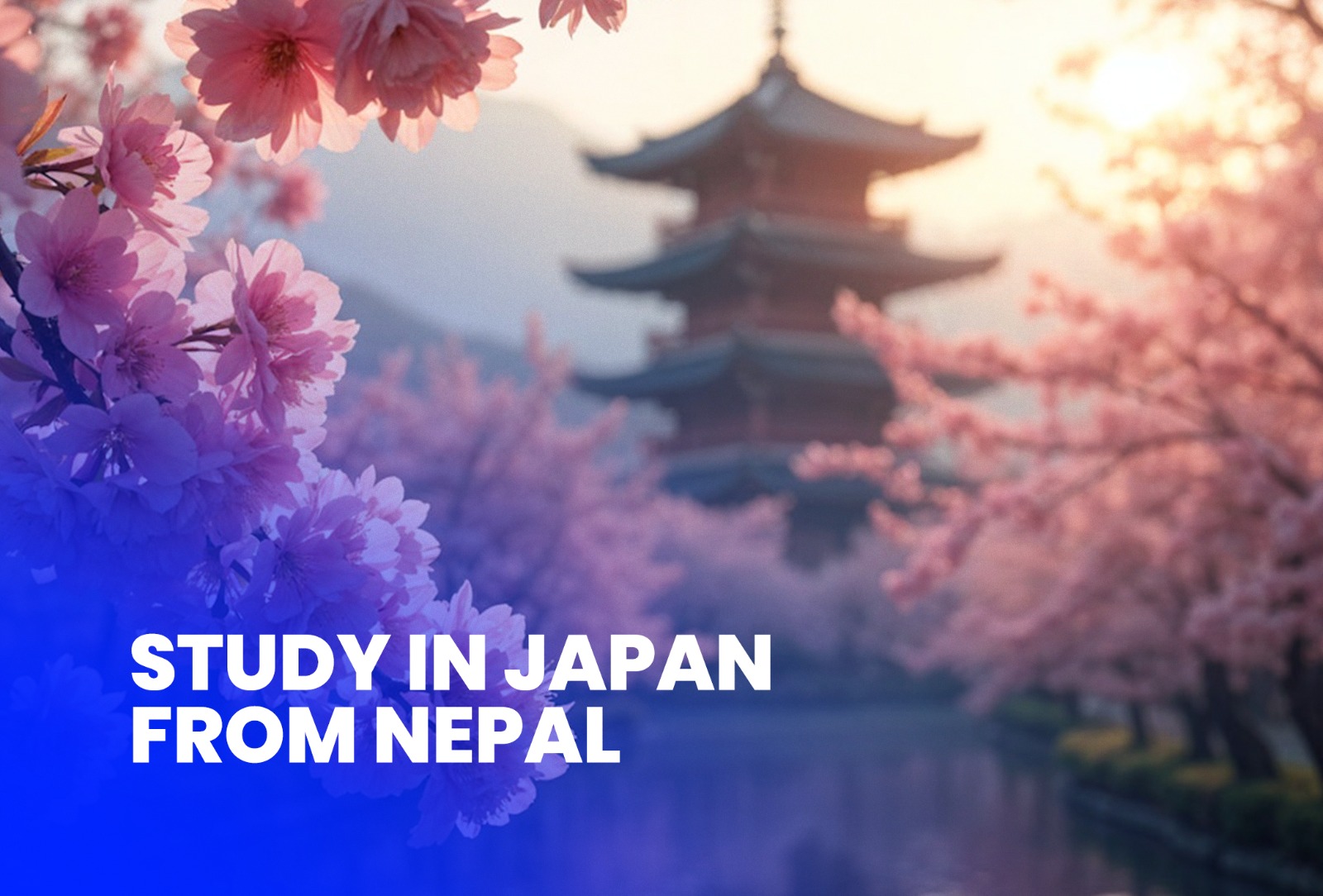.png)

Introduction
Are you a Nepali student with dreams of pursuing higher education in Japan? You're making an excellent choice. Japan stands as one of the premier destinations for international education, offering a perfect blend of academic excellence, cultural richness, and career opportunities that few countries can match.
Japan's education system is renowned worldwide for its advanced teaching methodologies, cutting-edge research facilities, and emphasis on both theoretical knowledge and practical skills. Unlike Western destinations that often come with prohibitively high costs, Japan offers world-class education at comparatively affordable rates, making it particularly attractive for Nepali students seeking quality education within budget constraints.
This comprehensive guide will walk you through every aspect of your educational journey to Japan from understanding the Japanese education system and admission requirements to managing finances, obtaining visas, finding accommodations, and building a successful career post-graduation. By the end of this guide, you'll have a clear roadmap for turning your dream of studying in Japan into reality.
Table of Contents
Complete Guide: Study in Japan from Nepal
Japan has emerged as an increasingly popular destination for Nepali students, and for good reason. Let's explore the compelling advantages that make Japan stand out among global education destinations:
Beyond the broader advantages mentioned above, studying in Japan offers several specific benefits that can significantly enhance your educational and professional journey:
Understanding Japan's education structure is crucial for planning your academic journey effectively:
Certain academic fields have proven particularly rewarding for Nepali students in Japan, offering strong employment prospects both in Japan and internationally:
Meeting the right requirements is crucial for a successful application. Here's a detailed breakdown of what you'll need:
Japanese language proficiency is a critical factor for academic success in Japan, even for programs taught in English:
Japanese universities generally have flexible policies regarding academic gaps, but there are important considerations:
Understanding the complete financial picture is essential for planning your studies in Japan:
Language Schools (Detailed)
Undergraduate Programs (Detailed)
Graduate Programs (Detailed)
Accommodation Options
Food Expenses
Transportation
Health Insurance
Communication
Miscellaneous Expenses
Working part-time can significantly offset living expenses while studying in Japan:
Retail and Service Industry
Factory and Warehouse Work
Skilled Positions
University-Related Work
Japan offers numerous scholarship opportunities specifically designed for international students:
MEXT (Monbukagakusho) Scholarship
JASSO Scholarship (Japan Student Services Organization)
Securing the proper visa is a crucial step in your journey to study in Japan:
Certificate of Eligibility (COE)
Visa Application at Japanese Embassy in Kathmandu
Japan offers various pathways for international graduates to build careers and establish themselves:
Q: What is the ideal timeline for applying to Japanese universities?
A: Begin preparations 12-18 months before your intended start date. For April admission, start preparing the previous March-April. For October admission, begin preparations in September-October of the previous year. This allows time for language study, entrance exam preparation, and the visa application process.
Q: Do I need to speak Japanese to study in Japan? A: It depends on your program. For Japanese-taught programs, you'll need at least N2 level Japanese proficiency. However, many universities now offer English-taught degree programs (especially at graduate level) where Japanese language skills are not required for admission. Even in English programs, basic Japanese skills will significantly improve your daily life experience.
Q: How competitive is admission to Japanese universities for Nepali students? A: Competitiveness varies widely by university and program. Top national universities like University of Tokyo and Kyoto University are extremely competitive. Private universities and specialized programs typically have more accessible admission rates. English-taught programs may be less competitive than their Japanese counterparts but often have higher academic requirements.
Q: Can I transfer credits from a Nepali university to a Japanese university?
A: Credit transfer is possible but highly dependent on the receiving university. Japanese universities evaluate foreign credits on a case-by-case basis. Generally, you'll need detailed course descriptions, syllabi, and official transcripts. Even with credit transfers, expect to complete at least 2-3 years of study in Japan for a bachelor's degree.
Q: How much money should I save before coming to Japan?
A: You should have at least 6 months of living expenses (approximately ¥600,000-800,000 or $4,200-5,600) plus first-semester tuition if not covered by scholarships. This amount ensures you can settle in comfortably and handle unexpected expenses before establishing part-time work.
Q: Is it possible to study in Japan without scholarships?
A: Yes, many Nepali students fund their studies through a combination of personal savings, family support, and part-time work in Japan. With careful budgeting and consistent part-time work, it's possible to cover living expenses, though having funds for initial tuition is important.
Q: How reliable is part-time income for covering expenses?
A: Part-time work can reliably cover basic living expenses but may not be sufficient for tuition fees. Most students earn ¥80,000-120,000 ($560-840) monthly working 20-28 hours weekly. This typically covers accommodation, food, and daily expenses but not tuition fees for most private universities.
Q: What are the banking options for Nepali students in Japan?
A: Japan Post Bank (Yucho Ginko) is the most accessible for international students. Shinsei Bank and Sony Bank offer English services. Most banks require a residence card, address registration, and phone number to open an account. International money transfers can be arranged through banks or services like TransferWise (Wise), GoRemit, or Western Union.
Q: What happens if my visa expires while I'm still studying? A: You must apply for a visa extension before the expiration date. Applications can be submitted up to 3 months before expiration. Continuing to stay in Japan with an expired visa, even if you're still a registered student, is illegal and can result in deportation and future visa restrictions.
Q: Can family members visit me in Japan?
A: Yes, family members can apply for short-term visitor visas. You'll need to provide an invitation letter, your residence card copy, and proof of your relationship. For longer stays, family members may apply for dependent visas if you can demonstrate sufficient financial resources to support them.
Q: What if I want to change schools while in Japan?
A: Changing schools requires notification to the Immigration Bureau within 14 days of the change. You'll need a letter of acceptance from your new school and a certificate of withdrawal from your current school. In some cases, you may need to apply for a new status of residence if changing to a significantly different program type.
Q: How strict are immigration authorities about student activities?
A: Japanese immigration authorities monitor student activities closely. Attendance records below 80%, unauthorized work, or working beyond permitted hours can lead to visa revocation. Regular progress in your studies is expected, and repeatedly failing classes may affect visa renewal.
Studying in Japan represents a transformative opportunity for Nepali students. The journey requires careful planning, dedication, and adaptability, but the rewards are substantial. A Japanese education offers not just academic knowledge but also valuable life skills. Exposure to a different educational system and cultural environment broadens your worldview and enhances your ability to work in diverse settings. Overcoming challenges in a foreign country builds resilience, independence, and problem-solving abilities that serve you throughout life. The combination of a quality degree, Japanese language skills, and international experience creates a competitive edge in the global job market.Graduates become important bridges between Nepal and Japan, contributing to stronger bilateral relations and cross-cultural understanding. The networks and friendships formed during your time in Japan can lead to ongoing personal and professional opportunities.
Whether you choose to build a career in Japan, return to Nepal, or explore opportunities elsewhere, your Japanese education provides a foundation for success. The investment in time, effort, and resources pays dividends throughout your life, opening doors to opportunities that might otherwise remain inaccessible.
Your journey to study in Japan is more than an educational pursuit—it's a path to personal transformation and future success. With careful preparation and a positive mindset, you can make the most of this valuable opportunity and build a bright future that spans cultures and continents.

Are you dreaming of studying information technology in one of the world's most technologically a...
Read MoreAre you dreaming of pursuing business education in one of the world's most advanced economies? J...
Read More
Every year, more than 240,000 international students choose Japan for higher education, and a rising...
Read More
Japan is increasingly becoming a top destination for higher education among Nepalese students. With...
Read More

Begin a transforming journey with Asahi and
Take off with
passion and self-assurance.
ⓒCopyright 2025 Asahi . All rights reserved | Powered By:Communicate